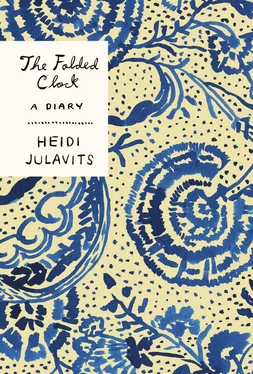“Because I’m eating to die,” I said to my husband.
My husband is an alarmingly smart man; he’s a unique thinker to his bones. He is, as a friend once said, a monk or a holy person who might better live in a tower or the desert. He thrives on discipline and solitude. Despite the fact that he has a family and a job and a wife who is always planning parties that he must cook for and attend, he manages to maintain his iconoclastic integrity. Most remarkably he can, without compromising this integrity, happily follow the occasional diet mastermind like Dr. Fuhrman. He has followed a few masterminds since we got married (these are not whimsical switches; he keeps up on the research and responds in kind). While I take pleasure (when I’m trying to reason him out of his health pursuits) in pointing out how, for example, he is able to endorse the belief “fruit is bad, never eat fruit,” and then, after a mastermind shift, “fruit is great, eat as much fruit as you want,” what I’m really expressing is insecurity. He can weather a belief reversal — one based on science, granted — without doubting the soundness of his faith or his mind.
I, however, am often insecure about what I believe. So, most of the time, is my husband. “Insecure” is maybe not the right word to describe us. We are avid second-guessers because, though we are both professors and thus must act as authorities in certain situations, we find certainty a turnoff. We love to take a conviction we might, for a moment, entertain, and then turn it on its head and make a joke about it. This joking is our form of the Socratic method. Our jokes are interrogations that help us to figure out what we care about, and where our faith, at the moment, lies.
His unfailing certainty about his diet, thus, made me feel isolated. I was making jokes no one got but me. I was making jokes that weren’t, technically, jokes. They were criticisms driven by the fear that he was abandoning me to interrogate our future uncertainties alone.
Still, I tried to act supportive. Today I failed. I failed to act my best or at all. As my husband prepared his healthy dinner, and I prepared my moderately healthy one, I had what is best described as a tantrum.
Afterward I lay on the couch. My husband sat in a distant chair. I tried to explain why, when he was on a diet to manage his pain and secure his longevity — why, when he was trying his best not to more rapidly and miserably die — I was being so totally mean. I talked about how, as a woman , I’d spent literally decades around other women (myself included) who cared too much about food. Who obsessed over what they ate, and adhered to bib-lettuce-and-vinegar-only diets, and who became, over time, unhappy and sexless and dull. After watching for decades what I ate, I finally didn’t give a shit. I’d been freed from the female curse of perpetual self-dissatisfaction and pleasure denial. His caring about what he ate posed a threat to my enlightened, non-caring state.
I then confessed that I was jealous of Dr. Fuhrman. I further confessed that really I did not give a shit about Dr. Fuhrman; my issues were related to my feeling excluded and subsequently rejected by my husband. He’d found a passion I could not share. He believed and I didn’t. Once we spent an entire summer making and eating elaborate banana splits. Now we prepared side-by-side meals. We parallel cooked and I couldn’t help but extrapolate that soon we would parallel live , and that our vectors would someday permanently cease to cross. It turned out that (contrary to what I’d said to my friends) I was scared of his leaving me, but I worried he would do so by never breaking up with me and never moving out.
My husband listened. He confessed that he’d been unceasingly aware of my ambient enmity (my secret had not been such a secret, it seems). He understood, now that I’d explained myself, why. I think we are both worried about the perils of parallel living because we share so many parallels. We are so alike that we pursue the same passion and work at the same university and raise the same children and have the same sense of humor. At the dinner parties I force us to throw more often than is probably healthy for either of us, we are often the only two people laughing. No one makes me laugh more than he does. But we both worry, I think, that we are so alike that we might start to take for granted the health of our marriage, as we have, until recently, taken for granted the health of our bodies.
Today I found a Rolodex in a trash can at JFK. I was about to enter the security check when I remembered the half-full water bottle in my bag. I needed to dispose of it before I held up the security line and became the scourge of Terminal B. I found a tall, space-age trash can. Its smoothly rounded mouth resembled a portal. Before throwing the bottle into it, I looked inside. I saw a Rolodex of family photographs. I was in a hurry and didn’t have time to wonder Why is there a Rolodex in the trash can at JFK? I only knew that the Rolodex made me feel bad to the bone. No matter what I decided to do with the Rolodex (return it to the trash can; keep it), I was in a bind. The statement “The situation demanded something of me” felt extremely applicable. How would I respond to the situation?
Situations have demanded something of me before. Once, in my twenties, when I was studying in France, I was with a group of Americans approached by a con artist looking for money. The con artist, an American who was clearly not a student or a tourist, beseeched us, his fellow countrymen, for help. His wallet had been stolen! Also his father had died! He needed money to catch a train to his plane, which left from Paris tomorrow, and which he had to make so that he could attend his father’s funeral! Thank God I have found some Americans! He repeatedly said. We all knew the guy was conning us — he wore leather shoes in an era when Americans wore nothing but big white sneakers — but none of us wanted to be the first to call bullshit to his face. The situation demanded a choice. Who did we want to appear to be? To give him money was to appear stupid in front of our friends. To not give him money was to appear heartless. Most people, publicly at least, choose looking stupid over appearing heartless. Or most of the people I know would choose to look stupid.
The Rolodex, like the fake American tourist, was a lose-lose situation that nonetheless demanded a choice. No one was around to publicly shame me, but I am perfectly able to shame myself. And worse — around myself it is not a matter of appearing to be stupid or heartless; instead I confirm to myself that I am definitively one or the other.
To keep the Rolodex was to be stupid; to discard it was heartless.
I kept it.
In the security line, I worried. Wasn’t I a version of the gullible traveler who acts as an unwitting mule of illegality, i.e., the person who transports, as a kindness, a kilo of heroin hidden in a knitting bag for an innocent-seeming granny? If asked, how would I answer the question, Did a stranger give you anything to carry?
The situation gave me a Rolodex. The situation demanded of me that I carry it.
Maybe there was an explosive in the Rolodex. Maybe a suicide bomber suffered a crisis of faith or nerve at the security line and ditched the bomb and went back to Queens. Maybe the photos were acid tabs or coated with cocaine that, following a crafty extraction process, would yield enough to net me a life sentence in an Italian jail. (I was headed to Italy to go to the artist colony.) What if, while going through customs in Rome, a dog smelled the drugs on my Rolodex?
It was already becoming my Rolodex .
I made it through security. If the Rolodex contained a bomb, it was a good bomb. Maybe, instead of cocaine, the photos were coated with a bioweapon designed to release at cruising altitude. I called my parents to say good-bye. (I hoped it wasn’t good-bye .) I told them about the Rolodex. My dad said, “Someone in those photos must have really pissed someone off.” I’d also considered this possibility; the cursedness I’d sensed originated from anger or hate directed at a person in the Rolodex photos. Somebody needed to release himself from these bad feelings. He’d thrown the photos away, betting on the psychic exorcism of a landfill burial.
Читать дальше












